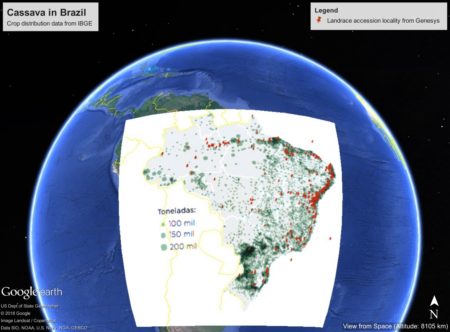- The Value of the IUCN Red List for Business Decision-Making. It’s actually a two-way street.
- Phylogeny and source climate impact seed dormancy and germination of restoration-relevant forb species. Significant variation among population for 7 out of 8 species tested.
- An integrated framework to identify wildlife populations under threat from climate change. Brings together exposure to change, sensitivity to change and range shift potential to prioritize among 10 bat populations. Maybe more widely applicable.
- Winners and losers of national and global efforts to reconcile agricultural intensification and biodiversity conservation. Agricultural intensification leads to significant threats to vertebrate diversity, most of which can however be avoided by international cooperation; that being unlikely, national level optimization in 10 countries is next best.
- Buckwheat Germplasm in the World. Its time will surely come.
- Geographical and environmental determinants of the genetic structure of wild barley in southeastern Anatolia. More diverse, and different from the domesticate, with distinct W and E groups, and 4 loci possibly responsible for abiotic adaptation.
- Pedigree, marker recruitment, and genetic diversity of modern sugarcane cultivars in China and the United States. Not much diversity, especially in China.
- Species turnover promotes the importance of bee diversity for crop pollination at regional scales. Pollinator diversity is even more important than we thought.
- Comparing and contrasting threat assessments of plant species at the global and sub-global level. Most of the almost 90,000 assessments come from regional efforts, not global.
- Determination of Camellia oleifera Abel. Germplasm Resources of Genetic Diversity in China using ISSR Markers. Hunan is the place for diversity of this woody oil crop I never heard of.
Featured: Hawaiian taro
Penny thinks traditional varieties are underrated:
Where Hawaii’s research stations and taro farmers practice good soil husbandry, timely harvests and plant stock culling practices, traditional taro varieties thrive. An old Hawaiian saying – nana i ke kumu; look to the source.
This was in reply to a Brainfood snippet on a recent paper by Vincent Lebot and colleagues: “Adapting clonally propagated crops to climatic changes: a global approach for taro (Colocasia esculenta (L.) Schott).”
Results indicated that hybrids tolerant to taro leaf blight (TLB, Phytophthora colocasiae Raciborski), developed by Hawaii, Papua New Guinea and Samoa breeding programmes outperformed local cultivars in most locations.
Brainfood: Lupinus diversity, African veggies, School food, Citrus collusion, Taro seeds, Hot seeds, Hunter-gatherers, Citrus phylogeny, Sheep management, Genebanks -> farmers
- Exploring the genetic and adaptive diversity of a pan-Mediterranean crop wild relative: narrow-leafed lupin. W-E migration.
- From lesser-known to super vegetables: the growing profile of African traditional leafy vegetables in promoting food security and wellness. I’m sold.
- Home-grown school feeding: promoting local production systems diversification through nutrition sensitive agriculture. Any traditional leafy greens, though?
- Citrus genebank collections: international collaboration opportunities between the US and Russia. Very complementary.
- Adapting clonally propagated crops to climatic changes: a global approach for taro (Colocasia esculenta (L.) Schott). The need for seed.
- High-temperature drying of seeds of wild Oryza species intended for long-term storage. The need for drying seeds at 45°C.
- Productivity, biodiversity, and pathogens influence the global hunter-gatherer population density. Come the zombie apocalypse, head for subtropical and temperate forest biomes.
- Genomics of the origin and evolution of Citrus. It all started when the SE foothills of the Himalayas got a bit dryer in the Miocene… But there’s only one genus (well, plus Poncirus), with 10 species. Oh and pummelos are really important.
- Sheep herding systems and animal genetic resource management in the Central Plateau region of Burkina Faso. The best strategy overall would be for rural breeders to specialize in maintaining purebreds and urban breeders, closer to markets, fattened F1 crossbreds. But that’s easier said than done.
- Access to genes: linkages between genebanks and farmers’ seed systems. You can do it in half a dozen different ways, but there are challenges with scale, sustainability and legal frameworks.
Stirring up a rabbit controversy
In 600 AD…
…Pope Gregory the Great … decreed that laurices — newborn or fetal rabbits — didn’t count as meat. Christians could therefore eat them during Lent. They became a popular delicacy, and hungry monks started breeding them. Their work transformed the wild, skittish European rabbit into a tame domestic animal that tolerates humans.
Or maybe not, says Ed Yong.
In fact, “…when it comes to domestication, …when is the wrong question.” Shoot. 1
Spatial data everywhere
Looks like mapping is in the air. Hardly had I finished messing around with European trees maps that I ran across this random dump of Brazilian crop distribution data. The source is given as the Brazilian Institute of Geography and Statistics (IBGE), but I was not able to find the original maps there. I still wanted to do a mashup with Genesys, though, of course, which meant a little more messing around.
In the end, it turned out to be fairly easy, though not as easy as with those EUFGIS shapefiles. You have to hack the map off that first website as a screenshot, then add the JPG as an image layer in Google Earth and tweak the corners until it more or less fits on top of the borders of Brazil, which is the bit that takes time. Once you’re happy with the fit, you can download an appropriate KML file from Genesys and plonk it on top. Here’s the result for cassava (click on the image to see it better).
The green splodges mean cassava cultivation according to IBGE, and the red dots are cassava landrace accessions from Genesys. That would be a pretty good way to identify gross geographic gaps in ex situ holdings, but for the fact that, crucially, there’s no data from the national collection at Cenargen in Genesys. Yet. We’re working on it. Stay tuned.
